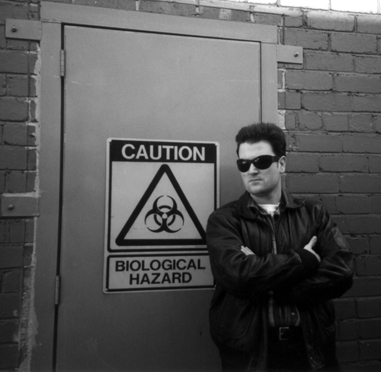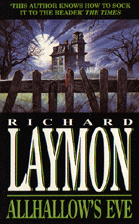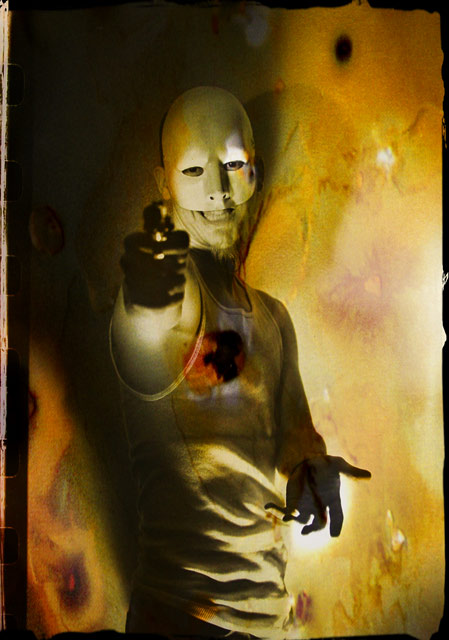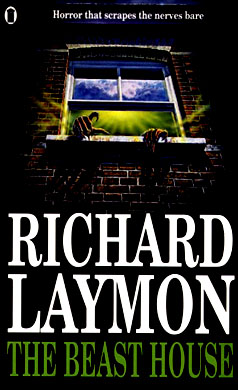
Steve Gerlach is one of Australia's premier dark thriller writers. The author of books like The Nocturne, Loves Lies Dying and Hunting Zoe, he also runs the Richard Laymon Kills website. His latest release is a hardback edition of the successful Rage.
Paul Kane; What made you start up the Richard Laymon Kills website in 1996? And how long have you been a fan of his work?
Steve Gerlach; I've been reading Laymon now for about 25 years. My first Laymon was The Woods Are Dark and I was hooked from the first chapter and never looked back. I always pestered publishers and bookstores about the next Laymon release, but they never seemed to have any details - or they didn't care. When I first connected to the internet in 1996, my first search was for a website dedicated to Laymon. I was pretty disappointed when I couldn't find one. So, I thought, it was up to me to become the one-stop-shop for everything Laymon. So, that's how it started. Luckily, the planets were all aligned and not only did I get the publishers support, but also Richard's support as well.

Paul Kane; How much has his writing influenced you, and do you have any other favourite writers?
Steve Gerlach; He's influenced me quite a deal, no doubt about that. As you find when you read my novels, they have the same cut-to-the-bone style as Richard. I like the way he writes, and I like reading that sort of style. So, I also like to write that way myself. I'm not one for pages and pages of description or exposition. But he's not my only inspiration. Robert Bloch, Richard Matheson, Rod Serling, Jack Ketchum have all influenced me over the years. I still have a letter Robert Bloch sent me and it's framed on my wall. He wrote it just before he died and I read it probably once a week.

Paul Kane: It was a big shock when Richard passed away. What do you think his legacy has been in the genre?
Steve Gerlach: Yes, it was a huge shock to all of us, and I'm not sure if the ripples of his passing have yet subsided. It took us all quite a while to recover from the news...and I can still remember exactly what I was doing when I first heard. And, of course, I thought it was a joke at the time. Now I just wish it was. I think Richard's legacy is twofold: one, always push the limits, both of the genre and yourself as a writer. He went to extremes, sometimes to sickening effect, but it always worked and he always managed to pull it off. Even with his latest release, Amara, I found myself shaking my head and thinking, 'Yep, Dick's done it again! I can't believe he wrote that!' Haha. It always works if it's Laymon. And the same goes for you as a writer. Always push yourself. Always trying something new. Always grow as a writer with your next novel or short story. I try to challenge myself with every novel I write, to do something new and different. That's what makes it exciting to write and tell these stories. His second legacy is: don't take it all so seriously. Richard was always happy, always willing to share a joke, always willing to go the extra mile for someone. In the end, this isn't rocket science, lighten up and enjoy it!
Paul Kane: You've had a very interesting career so far, including editor for a book publishers, editor-in-chief of a biking magazine and editor/publisher of the crime magazine Probable Cause. Can you tell us a little bit about these?
Steve Gerlach: Well, I don't want to mention the Publisher's name, because I went in there with a job to do, got disheartened by their lack of caring about the titles they produced and the writers they were supposed to be working with, and I soon left very disillusioned indeed. Let's just say it's a big multi-national publisher, and you'd know who they were if you heard their name. The superbike magazine was called Turn One and it debuted to great fanfare down here in Australia. I probably didn't know enough about the superbike world when I started, but I sure learned fast. Probable Cause was a political crime magazine that sold quite strongly in the US and Australia. I think the old issues are online somewhere now...including a very staged photo of this editor that I wish could be removed someday soon...
Paul Kane: So when did you first start writing fiction, Steve?
Steve Gerlach: It might sound strange, but I really don't know. I didn't wake up one morning and think, 'I want to be a writer.' It just happened over time. I remember my teachers at school used to say to me, 'Enough short stories, we have enough short stories, stop writing the short stories!' So I guess I was pretty prolific back in my school years. I moved away from fiction for a while when I spent 6 years at Australia's biggest newspaper, the Herald Sun. But I was still thinking about novels and stories and plots and characters, so it was probably a natural progression into novel writing, having done short stories and non-fiction. And that's where I find myself today.

Paul Kane: Your first novel to be published was Rage (pictured above), which is being re-issued in hardback by Bloodletting Press. Can you sum up what it's about?
Steve Gerlach: Well, it was the first novel I wrote. Hang on, let me start again. It was actually the third novel I wrote, but the first one I classed as actually making the grade. The first two, Unforeseen Circumstances and Injustice will probably stay locked in the trunk, as I don't believe they're up to standard. One day I may read them again, but I'm in no hurry. So, anyway, Rage was the third to be written, but actually The Nocturne and Loves Lies Dying were published before it. Confused yet?
Paul Kane: Oh, it doesn't take much to confuse me.
Steve Gerlach: So I hear. Haha. Anyway Rage tells the story of Ben Jackson, a loner, a guy who can't get a date. His life sucks, and he doesn't really see how he can go on. His family depresses him, his university depresses him, life depresses him. All he wants is the love of a girl...but he can't get one. So he gets a gun instead...The rest is, well, the rest is seen on the news and in newspapers quite often these days. It's one man's Rage against the system - and I think anyone who survived being a teenager will come to understand Ben's plight.
Paul Kane: Are there any changes to the book this time around?
Steve Gerlach: I'm not one for re-writing or re-editing books. As far as I'm concerned, once they're written they stay that way. Locked in that time and that place and that style. However, there were two vital scenes removed for the Aussie edition to make sure the book wouldn't be banned down here. Those two scenes, and a few extra sentences here and there, have been reinstated for the US hardback release. So, it really is an uncut, extreme edition!
Paul Kane: The Nocturne revolves around an implied government conspiracy. Are you a conspiracy theorist yourself? And what influenced the theme of this novel?
Steve Gerlach: Aaaah, but does it? Hahaha. Lots of people have debated the who-where-why behind that novel. Me? Well, I'm undecided. But seriously, I'm not the kind of person who believes without question what the government and media tell us. Remember? I worked for Murdoch for six years. And everyone has their own vested interest in protecting their own back. So I'm always open to conspiracy ideas and stories. They're much more exciting than the norm anyway. The goal with The Nocturne was to write a chase novel. A novel that wouldn't let the reader go, wouldn't stop, until the final page. From the feedback I've had from readers, it seems I succeeded. Which is always great to hear. It's terrific to hear what my readers think of a novel, as I always try to make each one totally different to the others. The variety is the key, and in The Nocturne I think there are only two places in 500 pages where the reader can actually stop and take a breath. Notice how I didn't really answer your question about the conspiracy? Ssshh, they're listening.

Paul Kane: Okay, I'll whisper...Loves Lies Dying has a terrifying premise. Can you tell us a bit more about this?
Steve Gerlach: Everything about Love Lies Dying is terrifying. Haha. The size of the novel, the scope, the characters... Poor Zoe. She's such a beautiful, quiet creature... The goal for Love Lies Dying was for me to write a novel with as few characters as possible, in as few settings as possible. There's three parts to the novel, and each part had to be totally separate in setting and pace to the others. In fact, in the first draft, the three sections were called, Love, then Lies and then Dying. But the story changed somewhat and I had to drop the part names, in case they gave some plot elements away. So they became the standard Parts One, Two and Three. I think Love Lies Dying is my most complex novel so far, dealing with how the past shapes each and every one of us, how people can create whole histories and backgrounds through the lies they believe, and also how far a man will go for a pretty lady - no matter what. Men sometimes want to play the hero - and people can play on that to get what they want. There's a great deal of personal experience in Love Lies Dying, and I think that's why it works so well. Thankfully, readers seem to agree.
Paul Kane: This one definitely has a Laymon influence, doesn't it. I'm thinking books like After Midnight for instance?
Steve Gerlach: Oh, I don't think there's any doubt about that. Both The Nocturne and Love Lies Dying have that influence strongly in the style and story. Rage is less so, as it was written almost 12 years ago now.
Paul Kane: Would you call yourself a thriller or horror writer - what's the difference? Is it all about marketing and selling to a particular audience?
Steve Gerlach: I really think it just depends on packaging. Publishers need clearly defined genres in which to place books. I don't write novels thinking, 'This one's going to be a thriller,' or 'This one can be horror.' I write a story with a premise and with characters. What happens next really is up to those characters and how they relate to each other and the events. I'd prefer my works to be marketed under the term 'dark thriller' but that just confuses everyone! Personally, I believe horror involves supernatural elements - something I've never cared to write about...not yet, anyway...as I think real life is much more scary - whereas thriller should and does deal with real events and situations that people can find themselves in. As my novels are more violent and don't necessarily come with a happy ending, I'd call them 'dark thrillers'. But I'm not a publisher and I don't get that call. The internet certainly makes it much easier to market yourself as a writer, the way you would like to be marketed. The new design of my website, which will be going live soon at http://www.stevegerlach.com, will show the shift away from the old Terror Australis site to a more professional look.
Paul Kane: What's the horror scene like over in Oz? And what about the small presses?
Steve Gerlach: In short, the horror scene is small and in critical condition. Don't get me wrong, there are readers aplenty and really I don't think they get enough of the great material available elsewhere. But as for magazines and short story outlets, they really don't exist. I've always written with the US market in mind, because you have to if you're going to survive. The small presses around the world are great, and it's terrific to see Wild Roses Productions entering the small press market down here. They have my full support and I congratulate them on the terrific job they've done so far.
Paul Kane: You were the Historical Advisor on the Australian film, Let's Get Skase, and I hear you've written a script yourself. Do you see yourself getting into the film biz at some point?
Steve Gerlach: Let's Get Skase came about because I was the guy who had access to the Skase files at the Herald Sun. It was fun to be a part of, but my influence on the film is minimal in the end. Although I did certainly help the screenwriters the most. I'm too close to my own material to write screenplays of my own novels, but there is an Australian screenwriter, Daryl Blake, currently working on a screenplay for The Nocturne. If that flies in the US, he'll then work on the others. He's done some great work on The Nocturne - adding and tweaking elements I would never have thought of - so I'm more than happy to just sit back and add my input when it's asked. If we break into film, that would be terrific, but I'm not holding my breath right now. There's a couple of production companies in the US sniffing around Rage too, but we'll have to see if anything comes of that.
Paul Kane: Hunting Zoe has a great tagline: 'She's beautiful. She's sexy. And she's very dangerous...' Sounds like the female Terminator. What can you tell us about this book, Steve?
Steve Gerlach: I want to tell you as little as possible! Hahaha. Actually, after Love Lies Dying, readers wanted to know more about Zoe. And I told them there was nothing more to tell. Well, I lied. Hunting Zoe is a novella that isn't a sequel to Love Lies Dying, it's a story that takes place in the Love Lies Dying world. It can be read by those who have read Love Lies Dying, and also by those who haven't. It's a side-trip, a campfire story, that will hopefully answer some questions...and ask some more. It's a cool read. I had a lot of fun writing it and those who have read it think it's terrific, which is always great to hear. Hopefully the US release of Love Lies Dying will include the Hunting Zoe side-trip. It'll be a huge book!

Paul Kane: What was it like being involved as editor on In Laymon's Terms?
Steve Gerlach: When the news broke that Richard had died, I wanted to get to work on a tribute anthology as soon as possible. I contacted Dick's agent and Hodder Headline and held talks. Hodder wasn't interested and it seemed Ed Gorman was working on the same kind of idea. So, I talked to Ed and we chatted about it for a while. In the end, Ed's anthology didn't come to light, but I was talking to Cemetery Dance and they were interested. So, I took hold of the fiction side while Kelly Laymon, Richard's daughter, came on board to edit the non-fiction. It's been a long hard slog, but the quality of the submissions were very high. It was hard to cut it down to a final selection. There'll be more news about In Laymon's Terms very soon. We want to make sure we have this just right before we release!
Paul Kane: Finally, what can we expect from Lake Mountain and The Dead of Night?
Steve Gerlach: I'm working on Lake Mountain now and, once again, it will be different to everything that came before. It'll be a road novel, a story of the friendship between two girls...and a crime will be committed. A nasty one. I'm pushing the limits again and I'm loving it. But it took a while to research this one. I had to make sure I'd get it all exactly right. It should be released late 2004 or early 2005. I think it's going to be very nasty indeed. Dead of Night? That'll be urban warfare. The city as jungle. And one small boy's fight for survival. But I'm not saying anything more about that either. Haha.
Paul Kane: Excellent chatting to you, Steve.
Steve Gerlach: A pleasure, Paul. Thanks for your time.
Visit the Steve Gerlach website at
Interview (C) Paul Kane & Steve Gerlach, August 2003.